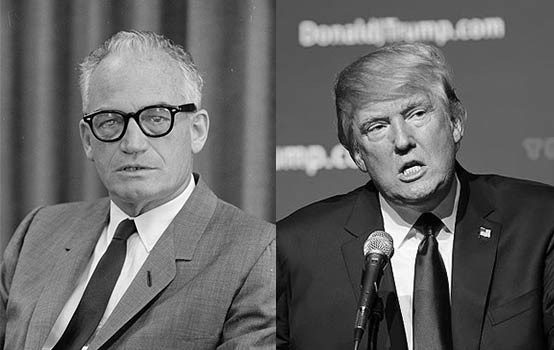Why Isn’t Donald Trump Losing Like Barry Goldwater?

One of the mysteries of this election is why the race is still so close, less than a month before November 8. Sure, all the official pundits say it is a sure win for Hillary, but the frantic actions of the Clinton campaign and its ally, the corporate media, belie their assurances. Thus the orchestrated nonstop revelations of women Donald Trump has allegedly groped. I’m sure it’s only a matter of days before we learn about The Donald’s gropings as a kindergartener. The last time we had a cacophony like this was when Howard Dean threatened to dethrone the war party in the 2004 Democratic primaries. (Remember that normal campaign-rally speech to his supporters in Iowa, incessantly played and distorted by the media to portray him as mentally unbalanced?)
I am reminded of the media war against Barry Goldwater in 1964. Goldwater’s problem was an excess of honesty, not recommended for a political candidate. Trump’s problem is his own narcissistic and buffoonish behavior, which plays into the hands of the Democrats and the establishment media (I know, that’s a redundancy). He refuses to take coaching advice, apparently believes in his own invincibility, seems to be as fixated on sex as the media are, and overreacts to every taunt by his opponents rather than sticking to attacking Clinton’s very clear vulnerabilities.
Goldwater was a sophisticated political operative by comparison (not to mention a much better man). Yet by this time in 1964, it was apparent that the election results would be disastrous for the candidate and his conservative supporters. And indeed, Goldwater lost the popular vote by 61.1 percent to 38.5 percent, and the Electoral College by a margin of 486 to 52.
In contrast, the polls this year show a relatively tight race, one within the normal historic range for a presidential campaign. What gives?
A tragic and staggering historical event—the assassination of President Kennedy on November 22, 1963—certainly had an immediate impact on the 1964 election. The prospect of three presidents in two years was a bit much for many Americans. But over the decades, changes in the political landscape tell us more about why the vote promises to be closer this year than in 1964.
First, 1964 was the new conservative movement’s first foray into a national race. We now know that as disastrous as the election results were that year, the campaign catapulted conservative ideas into the national political discourse. Ronald Reagan was able to win the presidency as a conservative in 1980, and ever since then more citizens have considered themselves conservative than liberal.
Second, the composition of the media has changed dramatically. In 1964, Americans got almost all of their political news from establishment media, most notably the three liberal television networks. Since then we’ve had the media revolution that Richard Viguerie and I documented in our 2004 book, America’s Right Turn—the Internet, talk radio, Fox News on cable TV, and the rest. Americans are no longer held hostage by liberal-media “gatekeepers.”
Then, of course, there is the populist revolution brewing around the world, including in the United States, as a reaction to the utter failures of the ruling elites. While the changed electorate and the changed composition of the media are by now well-established, this populist revolution is still in its infancy. Just as we couldn’t see the results of the Goldwater revolution in December 1964, we can only guess today the results of our current populist revolution.
Despite the nonstop media assault on Trump, most polls show national preferences at around 50 percent for Clinton and 40 percent for Trump. Given the unreliability of polls and the many unfolding aspects of this very unusual election (especially the WikLeaks disclosures), I consider this to be “within the margin of error.” There is a real possibility of Trump winning the popular vote in November, even if by a narrow margin.
There seems to be very little possibility, however, of Trump winning the vote in the Electoral College. So what if Trump wins the popular vote but Clinton wins the presidency in the Electoral College? I see that as a possible national disaster, especially since nobody understands the Electoral College anyway. The electorate on both sides is already more partisan and heated than I can remember since 1964, and Trump will not accept defeat as gently as Al Gore did in 2000. The results of having two presidential winners—one by popular vote, the other in the Electoral College—could be scary.
David Franke was a founder of the conservative movement in the late 1950s and early 1960s. He is currently writing his magnum opus on the trajectory of conservatism and American politics during his lifetime.
Comments